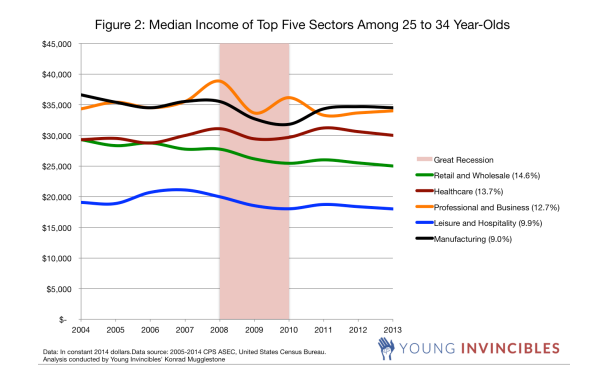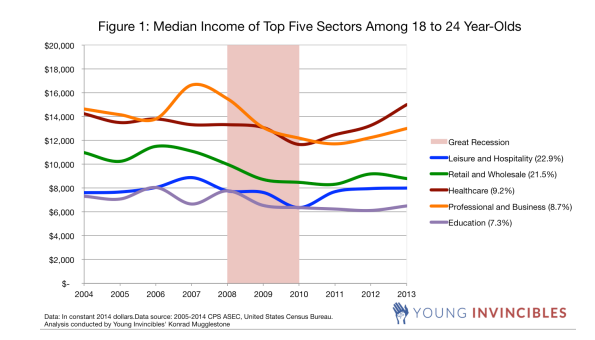You're Probably Not Getting A Raise (Unless You're Working in One Rapidly Growing Field...)
By:
Millennials are working in industries where pay is declining, according to a new survey from Young Invincibles.
Health care is the only place where pay is increasing
Among older Millennials (ages 25-34), the top five employment sectors are:
- Retail and Wholesale
- Health Care
- Professional and Business
- Leisure and Hospitality
- Manufacturing
Out of those five sectors, only health care has seen an increase in median wage over the last 10 years:

Young Millennials are doing no better
The story is similar for younger Millennials (ages 18-24), 70% of whom are working in the following industries:
- Leisure and Hospitality
- Retail and Wholesale
- Health Care
- Professional and Business
- Education

Again, except for health care, each of those top five sectors saw a decline in median income over the last 10 years.
So why is health care doing well?
According to the report, health care has two trends going for it:
1. Our population is aging. Baby Boomers are getting old, and there are a lot of them around. As our population ages with the Baby Boomers, the demand for medical care will continue to increase because old people need more health care. That demand drives up the wages of people working in the industry.
2. Professionals in the health care industry are getting older. There's been a shortage of employees in the health care industry as older workers in health care are retiring, and young people are taking their place. Since 2004, the industry doubled the amount of employees aged 18-34. (The survey does indicate whether health care is unique in this regard, though. As discussed below, many Baby Boomers are actually staying on the job longer in order to build up retirement savings.)
Wages as a whole are still not increasing
As we have discussed, wages are not increasing -- they are stagnant. According to a recent report from the San Francisco Federal Reserve, the starting salaries of college graduates have remained virtually flat since 2007 while the outlook is even grimmer for high school graduates. In 1979, high school graduates earned 77 cents on a college graduate's dollar. Today they make only 62 cents.
There are a few different guesses as to why this is happening. For one, Baby Boomers lost chunks of their retirement savings in the Great Recession. So, they are staying on the job longer, thus competing with Millennials for work. We could also cite the growth of unpaid internships.
On a macro level, the job market has not fully recovered. This creates a situation where employees have little leverage with their employer. If there are not higher paying jobs available, they are stuck in their current job, working for less money. It's important also to remember that employers really hate increasing pay. As economist Jared Bernstein put it, "The U.S. business model has devolved to a point where raising pay is antithetical to sound practice. If you’re a successful employer, it’s the very last thing you do, and you do it only if you’re pushed to the wall by such a tight labor market that you’ll literally lose workers and, thus, profits if you don’t."
Why are Millennials not working in better paying industries?
The jobs where pay is declining tend to be professions that do not require a post-secondary degree. That is, jobs you can get with a high school diploma. The authors believe that more Millennials need to earn post-secondary degrees in order to get jobs in industries where pay is increasing and out of industries where pay is declining. In 2020, 65% of jobs will require a post-secondary degree, but the study says Americans are not earning enough degrees to fill those jobs.
Thus, despite being the most educated generation ever, Millennials are still not educated enough.
